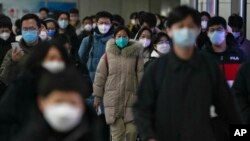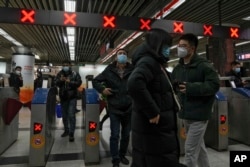Several local governments in China are urging people with mild cases of COVID-19 to go to work this week. The moves are a complete turnaround from the country’s long-standing “zero-COVID” policy. The policy forced anyone infected with the coronavirus to stay at a hospital or government-run center. China began taking steps to end the policy last month.
In the city of Guiyang in southern Guizhou, officials proposed that infected people with little or no symptoms should return to work in government offices and state-owned companies. They also proposed that emergency workers and those who work in healthcare, delivery, and food stores should also return to work.
The announcement Tuesday followed similar moves from the cities of Wuhu and Chongqing earlier this week.
The decisions appear to be in answer to worker shortages that have affected medical care and food deliveries. They also reflect the difficulty that officials face in trying to restart China's economy.
China had long said its “zero-COVID” policy kept the number of infections and deaths very low. But the policy placed China’s society and the national economy under great stress. The restrictions also led to rare anti-government protests.
Large increases expected
On Tuesday, health officials reported that five people died of COVID-19 in the latest 24-hour period in Beijing. The National Health Commission noted that it was not possible to keep an accurate number of new COVID cases since testing requirements have also ended.
Unofficial reports suggest a large wave of new COVID cases. Families of victims and people who work in the funeral business have also said deaths tied to COVID-19 are increasing.
There are concerns that China’s healthcare system cannot deal with the large increase of cases expected after the end of most zero-COVID restrictions.
Wang Guangfa is a doctor in the Respiratory Department of Peking University First Hospital. Wang warned that Beijing will see the peak of severe cases in the next one or two weeks.
He said in an article online, “The current wave of infection resembles an epidemic tsunami.” He said he expected northern China will have a higher rate of severe cases than southern China because of the cold weather in the north.
Dr. Gagandeep Kang studies viruses at the Christian Medical College in Vellore, India. Kang said China needs to give additional shots, called boosters, to older people in order to avoid large numbers of deaths.
China has had limited success in getting older people and high-risk individuals to get COVID-19 shots. Vaccination centers in recent days have been largely empty. There has been no major vaccination push by state-controlled media.
Another major concern is improving health resources in smaller cities and rural areas ahead of January’s Lunar New Year travel period. That is when migrant workers return to their hometowns.
I’m Ashley Thompson.
Dake Kang and Ken Moritsugu reported this story for The Associated Press. Hai Do adapted the story for Learning English.
______________________________________________________________
Words in This Story
mild - adj. not severe
symptom - n. a change in the body which indicates that a disease is present
reflect - v. to make something known
society - n. people of a particular country
stress - n. something that causes strong feeling or worry
accurate - adj. free from mistake or error
resemble - v. to look or be like
tsunami - n. very large wave in the ocean that is usually caused by an earthquake under the sea and that can cause great destruction







Forum